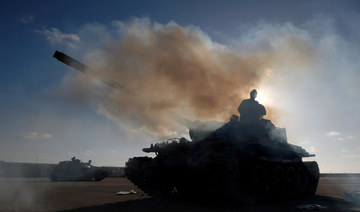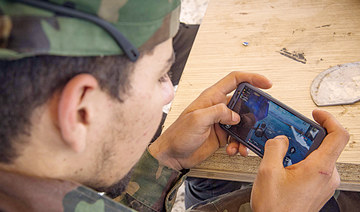TRIPOLI: Shoppers throng Tripoli’s Souk Al-Hout market but their mood is somber as Libya’s capital is again hit by violence and prices have shot up ahead of the holy month of Ramadan.
“Our country is famous for its dates,” a staple which Muslims eat first to break the Ramadan dawn-to-dusk fast, says shopkeeper Abdallah Al-Chaibi.
“But no one is able to buy them because their price has doubled,” he adds as he struggles to woo shoppers to buy the celebrated degla variety which are grown in southeastern Libya.
“I cannot imagine an iftar without dates,” he says.
During Ramadan, Muslims around the world abstain from eating, drinking, smoking and having sex from dawn to dusk.
They break the fast with a meal known as iftar and before dawn they have a second opportunity to eat and drink during sahoor.
In the days ahead of Ramadan — which begins on May 5 this year — families embark on shopping sprees to stock up on food for the iftar meal, which is often a feast that draws friends and relatives.
But renewed clashes between rival forces in and around Tripoli, a cash shortage and rising prices mean that this year’s iftar will be more frugal than those of previous years, and in oil-rich Libya that hurts.
“A large part of the population is unable to buy even basic items and guaranteeing (iftar) meals has become a challenge,” says Chaibi.
“In a wealthy country like Libya we are not used to this.”
Libya has been plagued by chaos, violence and economic hardship since the ouster of Muammar Qaddafi in a NATO-backed uprising in 2011.
On April 4, military commander Khalifa Haftar launched an offensive to seize Tripoli pitting his Libyan National Army against the Tripoli government forces backed by powerful militias in Tripoli’s southern suburbs.
The ensuing deadly clashes have killed 376 people according to the World Health Organization.
More than 40,000 have been displaced, according to the UN, but the figure does not include the many families who have sought safety with relatives.
“This will be the most difficult Ramadan in years,” said Malek Mohamad, a resident of Tripoli in the covered Souk Al-Hout market, where shoppers can find everything from fish to spices.
He said the fighting had forced thousands of residents of southern districts to flee with just a few of their belongings. “They now have to buy things and this will eat into their meagre budgets,” he said.
Since 2011, insecurity and shortages have been part of the daily lives of Libyans. Economic reforms launched last year were supposed to tackle a chronic lack of liquidity, but have been hit by the flare-up.
“Every time there is a glimmer of hope, a new military conflict erupts among Libyans,” says Mohamed Al-Noueri, who ekes out a living selling spices and garlic from a tiny stall in the market.
Noueri, 69, says he is responsible for the needs of a family of 10, including a daughter with a physical disability and sons who study at university.
He himself is diabetic and says he “struggles to buy my medication.”
“I am tired like many other (Libyans) who try to resist year upon year. And now war awaits us,” he adds, his face wrinkled and sad.
Housewife Manal Khayri is also desolate on the eve of Ramadan.
“I spent three days queueing outside a bank and only managed to withdraw 500 dinars (around $350),” she says.
“This will be barely enough to cover our needs for the first week of Ramadan,” says the mother of four as she shopped for pulses for her iftar meals.
“I pray to God to bring the Libyan people closer to each other,” she adds.
Authorities say they have taken measures to ensure there will be no shortages of basic food products during Ramadan.
Charities are planning to organize free iftar meals for the needy, including those displaced by the latest fighting.




























